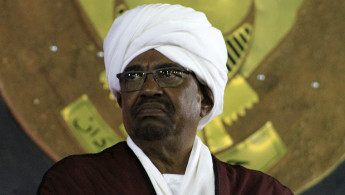Sudan president accuses Egypt of backing opponents
In his first such accusation against Cairo, Bashir said in an interview broadcast by Al-Arabiya that Sudanese opposition figures were "backed by Egyptian intelligence services".
"We raise this issue every time when we meet Egyptian officials," said Bashir.
Sudanese troops are fighting rebels in three conflict regions -- Darfur, Blue Nile and South Kordofan.
"Egyptian President Abdel Fattah al-Sisi is a good man and he is my friend, but it's the Egyptian intelligence that I am accusing," he said.
"I'm not accusing President Sisi. I'm accusing the regime."
Bashir also denied allegations that Khartoum was hosting several members of the Muslim Brotherhood movement banned by Cairo.
He reiterated that Sudan will protest to the United Nations if Egypt does not end its occupation of a border region claimed by his country.
Egypt occupied the sparsely populated 25,000-square-kilometre (10,000-square-mile) Halayeb triangle in 1995, during a low point in relations between the two countries.
Sudan has regularly protested about Egypt's administration of Halayeb, which lies near the Red Sea in a mineral-rich border region.
Khartoum says that Halayeb has been part of its sovereign territory since shortly after independence in 1956.
Bashir, who is wanted by the International Criminal Court on charges of war crimes and genocide related to the conflict in Darfur, also spoke in the interview of Sudan's ties with Washington.
The United States has blacklisted Sudan as a state sponsor of terrorism since 1993 and imposed a trade embargo on Khartoum in 1997 over its alleged support for Islamist groups.
"There is a five-point roadmap between us and the United States. The first point, terrorism, has been completed 100 percent and the Americans have acknowledged that," said Bashir.
He said he now expected the US Congress to remove Sudan from the blacklist.
Before he left office, former US president Barack Obama announced in a letter to Congress that he was easing economic sanctions against Khartoum.





 Follow the Middle East's top stories in English at The New Arab on Google News
Follow the Middle East's top stories in English at The New Arab on Google News
![The UAE is widely suspected of arming the RSF militia [Getty]](/sites/default/files/styles/image_330x185/public/2024-11/GettyImages-472529908.jpg?h=69f2b9d0&itok=Yauw3YTG)
![Netanyahu furiously denounced the ICC [Getty]](/sites/default/files/styles/image_330x185/public/2024-11/GettyImages-2169352575.jpg?h=199d8c1f&itok=-vRiruf5)
![Both Hamas and the Palestinian Authority welcomed the ICC arrest warrants [Getty]](/sites/default/files/styles/image_330x185/public/2024-11/GettyImages-2178351173.jpg?h=199d8c1f&itok=TV858iVg)